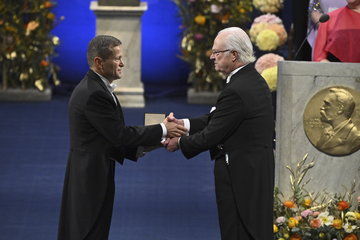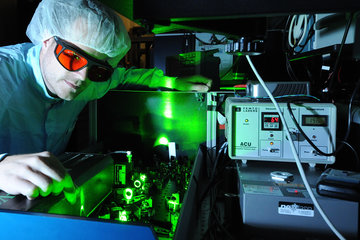The Max Planck Society congratulates Emmanuelle Charpentier on winning 2017 Japan Prize
Prestigious Japan Prize goes to Max Planck scientist for a third time
It is often referred to as the Japanese Nobel Prize: 88 prize winners from 13 countries have received it since it was awarded for the first time in 1985 - including many later Nobel Prize Laureates. Emmanuelle Charpentier from the Max Planck Institute for Infection Biology, Berlin, and Jennifer A. Doudna from the University of California, Berkeley, receive this year's Japan Prize for the development of the CRISPR-Cas9 gene-editing technique, a type of very efficient genetic 'scissors'. Adi Shamir, from the Weizmann Institute, Israel, is honoured for his pioneering research on cryptography. The award ceremony will take place on April 19 at the National Theater in Tokyo.

The CRISPR-Cas9 system of bacteria can be used as an extremely precise tool to edit genetic material and study gene function, raising hope that CRISPR-Cas9 can be used to develop new treatment options for serious human diseases in the future. This discovery was a milestone for molecular biology, and has already won many prizes. Charpentier has received, amongst other, such prestigious awards as the Breakthrough Prize in Life Sciences, Ernst Jung Prize for Medicine, the Louis-Jeantet Prize for Medicine as well as the Paul-Ehrlich-und-Ludwig-Darmstaedter Prize.
The Max Planck Society offers its warmest congratulations to Emmanuelle Charpentier on winning this major award. "I am particularly delighted that a scientist is being honoured who is still in midst of her research career. I hope that this also serves as a motivation for other young women in science", said Max Planck President Martin Stratmann.

The cryptology expert and 2002 Turing prize winner Adi Shamir, from the Weinzmann Institute, Rehovot, also receives this year's prize in the field of “Electronics, Information and Communication”. Shamir was the Keynote Speaker at the Max Planck Society's Annual Meeting 2016. Shamir has developed the 'RSA cryptosystem', an innovative encryption technology, as well as mathematical methods, which enable an identification of individuals in the field of information security without the need to disclose the closures.
BA













